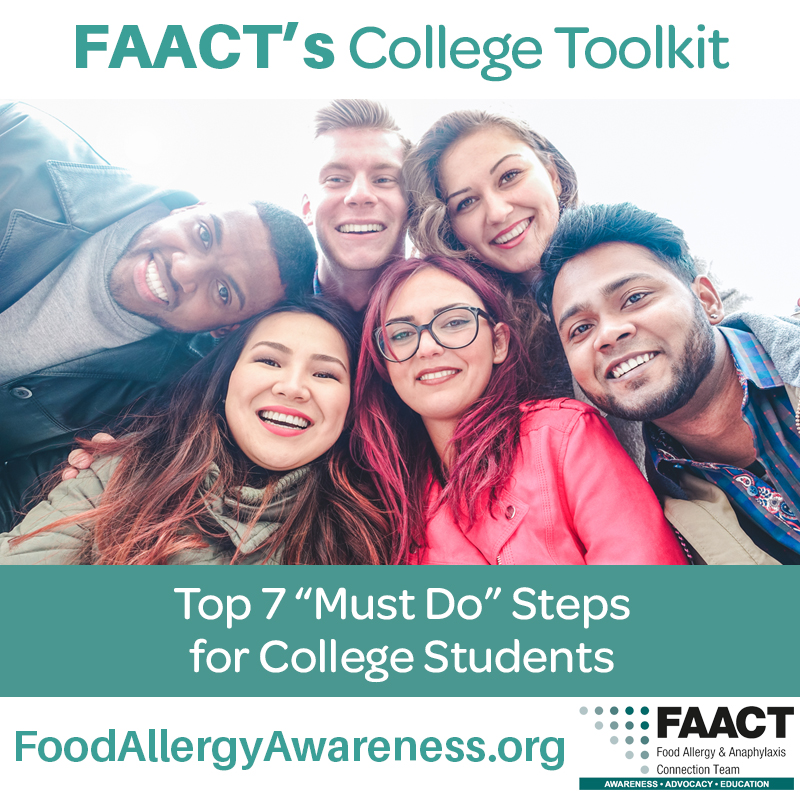FAACT's College Resource Center
For Students
Back to Category View
Top 7 “Must Do” Steps for College Students
Ready for the next step after high school? This checklist provides a quick, at-a-glance look at the most critical areas to consider on the journey to attending college. For much more detail and in-depth checklists, read the rest of FAACT’s College Toolkit.
Download FAACT's 7 "Must Do" Steps for College Students Checklist.
- Contact the Disabilities Office
- Contact the Disabilities Office or Academic Support Office to establish the food allergy accommodations you need.
- Secure a meeting ASAP! The Covid-19 pandemic has affected staffing levels and office hours, so you may experience longer wait times.
- Contact the Disabilities Office or Academic Support Office to establish the food allergy accommodations you need.
- Dish with Dining Services
- Speak with Dining Services administrators to confirm how you will eat safely on campus.
- Ensure you understand your responsibilities and the school’s responsibilities.
- Explore Housing Options
- Talk with your board-certified allergist about whether you need allergens to be kept completely out of the room or if it’s okay for your roommate to have them.
- Talk to Housing administrators about securing a medical single (if needed) or how you can be matched with a roommate who will support your food allergy needs in the dorm room.
- Find out if additional documentation is needed from your doctor.
- Speak with Professors, Teaching Assistants, and Other Staff
- Speak with or email all the people you might interact with in class (including student workers) to give them a heads up about your food allergies.
- Certain classes can involve the use of food allergens, such as proteins used in labs.
- Certain classes can involve the use of food allergens, such as proteins used in labs.
- Speak with or email all the people you might interact with in class (including student workers) to give them a heads up about your food allergies.
- Explore Emergency Services
- Plan how you will carry auto-injectable epinephrine with you at all times and where to store medications in an easily accessible location in your dorm room.
- Find out how to call for help on campus. (Some colleges require students to call campus security rather than 911.) Learn where local hospitals are in the event of an emergency.
- Manage Your Health
- Schedule a doctor’s appointment to create or review an Allergy & Anaphylaxis Emergency Plan, request prescriptions for the upcoming year, and review your current health status.
- Confirm whether your college requires students to have the Covid-19 vaccination (and what proof is required).
- Mental health is equally essential. Create a plan to manage anxiety and stress. Try new coping techniques.
- College is fun, but it can be overwhelming, especially during the first few months. Do at least one thing that you love every day, whether it’s reading a book, going for a run, watching silly videos, or something else entirely!
- College is fun, but it can be overwhelming, especially during the first few months. Do at least one thing that you love every day, whether it’s reading a book, going for a run, watching silly videos, or something else entirely!
- Schedule a doctor’s appointment to create or review an Allergy & Anaphylaxis Emergency Plan, request prescriptions for the upcoming year, and review your current health status.
- Educate New Friends
- You will meet many new people at college. Some will become lifelong friends. Get comfortable with a plan to tell new friends, roommates, and other students about your food allergies and where you carry emergency epinephrine auto-injectors.
- You are not a burden. College students have shared that they want to know about friends with food allergies so they can help during an emergency.
- Do you have a ‘“sign’” if you need epinephrine? You might be too far away for someone to hear you clearly, and anaphylaxis can make it difficult to speak. Learn FAACT’s Fist to Thigh “Sign” and share it with your friends!
- You will meet many new people at college. Some will become lifelong friends. Get comfortable with a plan to tell new friends, roommates, and other students about your food allergies and where you carry emergency epinephrine auto-injectors.